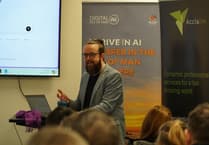‘It’s like your traditional corner shop. It’s got everything. It’s got one-to-one counselling, it’s got groups, support for the individual, support for families, children and young people. We’ve got auricular acupuncture and relaxation sessions and weekly well-being workshops on mental health, and other related topics. It’s got so much on offer.’
That’s Thea Ozenturk, the Chief Executive Officer at Motiv8 Addiction Services. She speaks with a gravitas and sincerity that only comes from working with an organisation and helping it grow for more than 30 years, which Thea has.
‘It’s an amazing place to be.’ Also, in the room with us is Motiv8’s Fundraiser Nicola Browne, who’s recently celebrated three years at the charity. ‘The work the team does is life changing. The support they bring to those that come through the doors is unbelievable.’
If you haven’t heard of Motiv8, it’s a talking therapy service supporting anyone on the island impacted by alcohol, drugs, gambling, and gaming. It also aims to reduce the stigma surrounding substance misuse and dependency. Motiv8 is quickly approaching its 50th anniversary in 2028 and, what started off as a small team of three in a little office in town, has grown into a full-blown team of 18 and 7 peer mentors that saw close to 6,000 sets of feet accessing sessions last year.
During a recent rebrand and redesign of its website, Motiv8 has placed a high emphasis on the use of language. Language, naturally, speaks volumes, and someone’s choice of words can be the difference between making a vulnerable person feel alienated or accepted.
‘People can see addiction as a label that they don’t associate themselves with,’ Thea tells me.
‘It can feel very judgemental, and it’s always seen as someone else’s problem. And yet, you can see a lot of functioning people who’ve got high positions in work, responsible jobs, and families that have a problem of some type. For example, dependency on alcohol or prescription medication.’
The stereotype that comes to mind when someone says the word ‘addiction’ can often be the most severe version, the one many of us have seen depicted in films. A ‘down and out’ person. Someone who falls outside of the societal norm, who has no job, no home, no family, or friends, but it’s a stereotype that’s inaccurate and outdated.
‘About 25% of the population will be drinking in a way that’s harmful to them,’ Nicola says. ‘About 5% will have a significant dependency, but I think it’s important to say that a lot of the time it involves people going to work and functioning with this happening in the background, and around 1,800 children on the Isle of Man are impacted by parental substance misuse.’
Often, people can function day-to-day in a way that feels habitual – a few glasses of wine at the end of work, a few hours of gaming or gambling before bed – making it difficult to see when that slips into being a problem.
‘If you look at our website, we try and make the information as accessible and non-judgemental as possible. So, instead of saying something like “could you have an addiction” we ask, “is it causing you problems?” For example, is alcohol causing you physical problems, or psychological problems, or relationship problems, have you experienced any of these, etc. If you use language like that rather than dependency or addiction, you’re more likely to get people in the earlier stages coming forward, which is better, as it gives stronger outcomes and recovery for them.’
Words can either be a barrier or a gateway. And the new Motiv8 website aims to give people hope by incorporating positive messaging mixed with people’s real-life stories.
‘We wanted to refresh the brand,’ Thea tells me enthusiastically, ‘and home in on the message about recovery being more accessible and achievable. When you think about alcohol and drugs, there’s quite a lot of negative connotations around that. So, we wanted people not to feel judged, labelled, or stigmatized. Now if you look at our website, you’ll see it’s all very positive.’
The whole ethos of Motiv8 for anyone looking for help – be that an individual or a family member – is that you’re not alone, you are not judged, and other people have achieved recovery. However, acknowledging when you need help and seeking support can be incredibly difficult. It’s scary and takes a lot of courage, even more so when living where we do.
‘I think perhaps anywhere it’s difficult to reach out for help but in smaller communities, like here, it is perceived as somehow worse. We aim to give people that confidential, non-judgemental support through our one-to-one counselling and with groups too. These sessions are confidential and all those who come through the doors understand and appreciate that too.’
It’s something the charity prides itself on, as Nicola tells me.
‘There are no waiting lists, no signs outside the building, which keeps confidentiality for when attending sessions. There’s no waiting room, so, you ring the bell, you come in, and you go straight to a counselling room. All our councillors are on a path or have already achieved accreditation. And a third of our team is made up of workers by experience, who have been there, which brings another level of understanding to our service. If you’re having one-to-one support, you will not see another member of public in the building. And even the group work we offer, it’s still confidential. And on top of the seriousness of anonymity, we have a very friendly atmosphere. It’s an amazing place to be involved in.’
Motiv8 is a strategic partner with Manx Care for core services, but many of the extra services the charity offers – family service, arrest referral schemes for people arrested with a small amount of substance or under the influence of alcohol, gambling support – all of which are free to the public, rely solely on public donations.
‘We’re incredibly grateful for any donations the charity receives. Costs are rising for everyone, and that of course includes charities, so that means that each year we need more donations to just stand still,’ Nicola says when I ask her how things are funds wise.
‘Fundraising is the lifeblood of the charity; it’s the only way we can continue, it can be tough for all charities, and I welcome conversations with anyone that might be in a position to support our work.’
One of the things Motiv8 is aspiring to, which will require more funding, is to make the charity more digital and introduce a chat facility on the website. It would work alongside the phone service to help make the charity as accessible as possible for people, particularly younger people, who aren’t very comfortable speaking on the phone.
‘It’s also about getting into the community,’ Thea tells me. ‘Accessibility, that’s the future for addiction services. You’ve got to take them out of your traditional sort of therapeutic model of nine to five, Monday to Friday, and one hour. Instead, we try to open it up so people can have a more choice when it comes to the type of help they want to receive for their own recovery journey and when they can access that help.’
From talking with Thea and Nicola, I had huge admiration for the work they do to continue making Motiv8 the best and most accessible it can be for anyone who needs it. However, I’d imagine it’s a role that can be as challenging as it is rewarding.
‘No two days are the same,’ Thea tells me. ‘A major part of our work is with families, so this is about breaking the cycle of addiction, supporting children, and running education programmes in schools. But as a role, it’s very rewarding. And I’m there to support the fantastic work the team does, and in turn, the clients. People don’t want to pick up that phone. They don’t want to say, “I’ve got a problem” so we’re trying to remove that. And is it life changing? Yes, it is.’
To find out more about Motiv8, you can either head on over to their Facebook page – Motiv8 Addiction Services – or their website – motiv8.im.
Article sponsored by Apricot.

-(1).jpeg?width=209&height=140&crop=209:145,smart&quality=75)


.jpeg?width=209&height=140&crop=209:145,smart&quality=75)